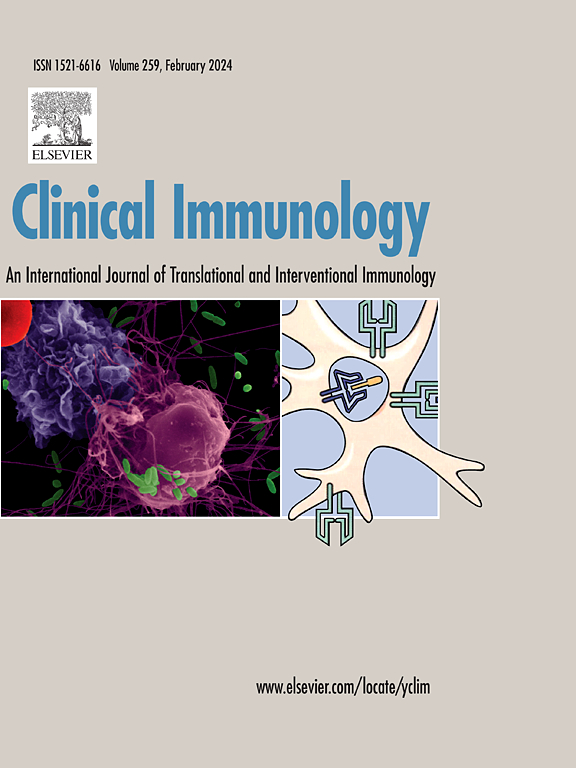治疗复发缓解型多发性硬化症的克拉利宾片优先靶向 B 细胞。
IF 4.5
3区 医学
Q2 IMMUNOLOGY
引用次数: 0
摘要
最近的研究证明了 B 细胞靶向疗法在控制多发性硬化症(MS)活动方面的疗效,强调了 B 细胞在多发性硬化症发病机制中的关键作用。CladB 研究旨在量化复发性缓解型多发性硬化症(RRMS)患者在服用克拉利宾片(CladT)96 周期间外周免疫细胞及其活性的时间变化。10名参与者(3男7女)在多个时间间隔(第0天、第1天、第5天,然后每周一次,持续8周;每两周一次,持续24周;每月一次,持续96周)采集血液样本进行免疫细胞分析。除了临床和脑成像评估外,还抽取配对脑脊液(CSF)进行各种分析。CladT消耗了记忆B细胞,而阿仑珠单抗则迅速消耗了T细胞和B细胞。48周时,кFLC指数从164.5 ± 227.1降至71.3 ± 84.7(p = 0.002),96周时降至64.4 ± 67.3(p = 0.01)。IgG 指数从基线时的 1.1 ± 0.5 降至 48 周时的 0.8 ± 0.4(p = 0.014)和 96 周时的 0.8 ± 0.3(p = 0.02)。脑脊液CXCL-13从88.6 ± 68.4 pg/mL降至48周时的39.4 ± 35.2 pg/mL(p = 0.037)和96周时的19.1 ± 11.7 pg/mL(p = 0.027)。48周时,CSF NfL水平降低(p = 0.01)。CladT主要消耗RRMS患者的记忆B细胞和抗体分泌细胞前体,从而持续影响鞘内抗体的产生和总IgG,并降低CSF CXCL-13。本文章由计算机程序翻译,如有差异,请以英文原文为准。
Cladribine tablets in relapsing-remitting multiple sclerosis preferentially target B-cells
Recent studies demonstrate the efficacy of B cell-targeting therapies in managing multiple sclerosis (MS) activity, emphasizing the critical role of B cells in MS pathogenesis. CladB study aimed to quantify the temporal changes in peripheral immune cells and their activity over 96 weeks of Cladribine tablets (CladT) treatment in relapsing-remitting MS (RRMS).
Ten participants (3 males, 7 females) had blood samples collected at multiple intervals (Day 0, 1, 5, then weekly for 8 weeks, biweekly for up to 24 weeks, and monthly for up to 96 weeks) for immune cell analysis, compared to a historical alemtuzumab-treated cohort. Paired cerebrospinal fluid (CSF) was also taken for various analyses, alongside clinical and brain imaging assessments.
CladT depleted memory B cells, while alemtuzumab rapidly depleted T and B cells. The кFLC index decreased from 164.5 ± 227.1 to 71.3 ± 84.7 at 48 weeks (p = 0.002) and to 64.4 ± 67.3 at 96 weeks (p = 0.01). The IgG index dropped from 1.1 ± 0.5 at baseline to 0.8 ± 0.4 at 48 weeks (p = 0.014) and to 0.8 ± 0.3 at 96 weeks (p = 0.02). CSF CXCL-13 decreased from 88.6 ± 68.4 pg/mL to 39.4 ± 35.2 pg/mL at 48 weeks (p = 0.037) and 19.1 ± 11.7 pg/mL at 96 weeks (p = 0.027). CSF NfL levels were reduced at 48 weeks (p = 0.01).
CladT primarily depletes memory B cells and antibody-secreting cell precursors in RRMS, leading to sustained effects on intrathecal antibody production and total IgG, and a reduction in CSF CXCL-13.
求助全文
通过发布文献求助,成功后即可免费获取论文全文。
去求助
来源期刊

Clinical immunology
医学-免疫学
CiteScore
12.30
自引率
1.20%
发文量
212
审稿时长
34 days
期刊介绍:
Clinical Immunology publishes original research delving into the molecular and cellular foundations of immunological diseases. Additionally, the journal includes reviews covering timely subjects in basic immunology, along with case reports and letters to the editor.
 求助内容:
求助内容: 应助结果提醒方式:
应助结果提醒方式:


